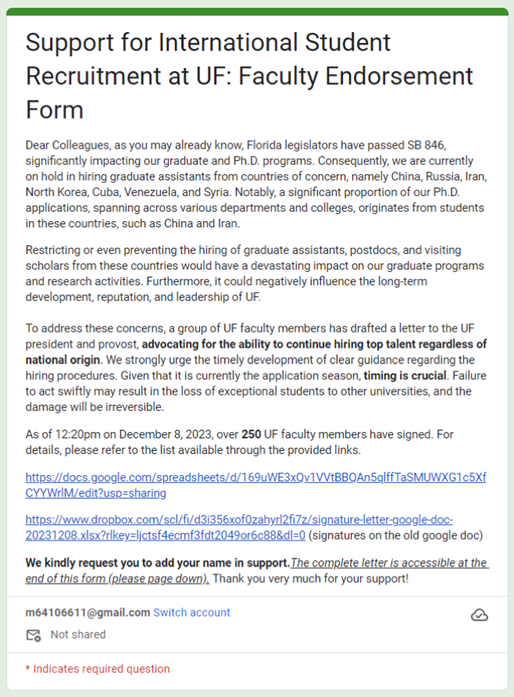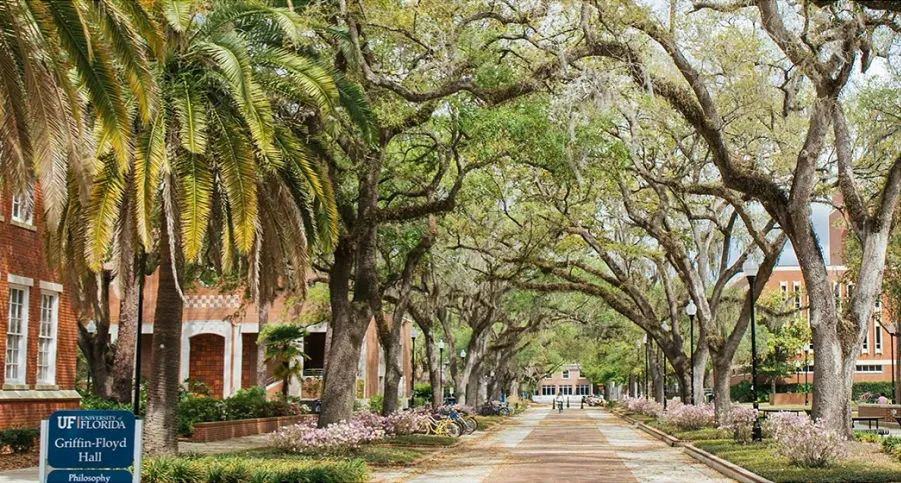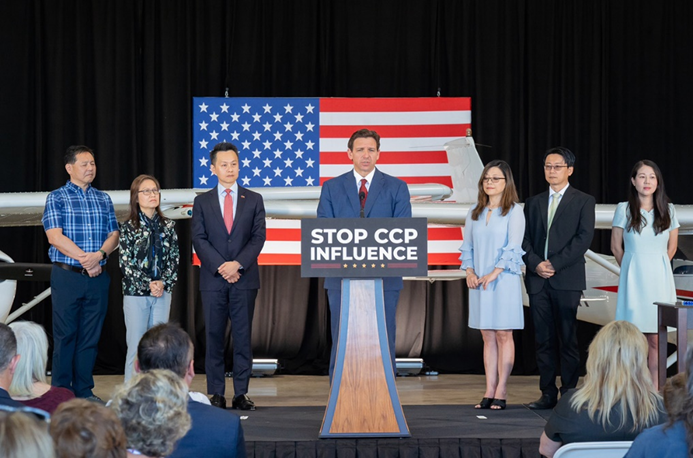
After Chinese students were banned from joining the laboratory, teachers at this American university were completely panicked.
Recently, more than 280 faculty members at the University of Florida signed a petition urging the school to respond to SB 846, which would allow faculty to recruit top graduate students from banned countries.

petition
In May of this year, Florida passed SB 846, which took effect in July. Research institutions are explicitly prohibited from receiving funding from or collaborating with entities from China and six other “countries of concern”.
Due to uncertainty about the bill, the University of Florida has also suspended admissions to Chinese graduate students in the fall of 2024. This made teachers at the school not only regret missing out on outstanding graduate students, but also bluntly said that this was "shooting themselves in the foot."

University of Florida. Source: school website
SB 846
The introduction of SB 846 has prevented teachers from 12 public universities and colleges in Florida from hiring Chinese graduate students and postdoctoral fellows to work in their laboratories.
In May of this year, Florida officially passed SB 846 in response to the so-called "countries of concern influencing campus activities and stealing intellectual property." The state’s public universities and colleges are prohibited from receiving any funding from or entering into agreements with China and “countries of concern” such as Russia, Cuba, Iran, North Korea, Syria and Venezuela.

Ron DeSantis signs bill to engage with China. Source: Florida Governor’s Office
The bill states that state universities and colleges may enter into partnerships with institutions in those countries only if they are approved and meet certain requirements that the Florida Board of Governors deems to be "not detrimental to the safety and security of the United States or its residents" or Carry out an agreement.
Restrictions under the bill include not only those currently residing in the relevant country, but also those who have trained or worked outside the United States for one year or more, even if they have U.S. citizenship. What's more, people who are turned away because of something suspicious in their background must also report it to the FBI or another law enforcement agency designated by the governor.
The enactment of SB 846 will mean a lengthy review and waiting process for those seeking graduate assistant or postdoctoral positions at Florida universities or colleges. Students from these countries can still be admitted to graduate programs, but cannot participate in research projects that pay a certain amount of compensation.
Supporters of the bill cited examples of efforts by some Florida scientists to fail to disclose collaborative projects with Chinese institutions or where public funds were used to conduct research locally.
But Rebecca Keizer, director of the National Science Foundation's new Office of Research Security, said restricting individuals from a specific country or region is never a good approach. She believes that a more appropriate solution is to reach a consensus with some precautions and appropriate safeguards, rather than creating antagonism between individuals.
" shooting oneself in the foot "
Although universities and colleges in Florida are drafting and implementing relevant regulations, the uncertainty caused by the bill has caused the 2024 fall admissions letters originally scheduled to be issued to Chinese graduate students from December to January to be suspended.
"We missed the best time to recruit students." Peng Zhongren, professor in the Department of Urban and Regional Planning at the University of Florida and director of the International Adaptation Planning and Design Research Center, said regretfully, "The best students will not wait. They will only go elsewhere. place."
Currently, the University of Florida employs approximately 350 graduate teaching assistants and 200 postdoctoral fellows from these seven relevant countries. This also allows teachers at the school to see the larger knock-on effects that the new law will have.
“Our graduate programs have a large number of outstanding applicants from these countries.” In their petition, they specifically mentioned that these outstanding students are mainly from China and Iran, and pointed out that such admissions restrictions may significantly reduce the number of applicants, resulting in The school's international status has plummeted.
What worries teachers is their ongoing research and even future developments.
Wenjun Xie of the University of Florida College of Pharmacy received a tenure-track teaching position in July this year. He worries that restrictions on students from China and other countries enrolling or participating in scientific research will affect the staffing of laboratories and weaken the ability to obtain federal research funding. "As a new researcher working in the rapidly evolving field of artificial intelligence, the current situation is very tricky for me."
Li Chenglong, who hired Xie Wenjun, is a tenured professor at the school of pharmacy. He believes that this is shooting himself in the foot. "It will damage the reputation of the University of Florida as it strives to achieve significant achievements in artificial intelligence."
"As scientific researchers, we are committed not to discriminate against anyone based on race or national origin." What worries Li Chenglong is that this law may cause teachers who receive federal grant support to be in conflict with the U.S. law prohibiting discrimination against those who receive federal funding. Conflict, “But SB 846 does exactly that.”
Reference Information:
https://www.flsenate.gov/Session/Bill/2023/846/BillText/er/PDF
https://www.science.org/content/article/new-florida-law-blocks-chinese-students-from-academic-labs